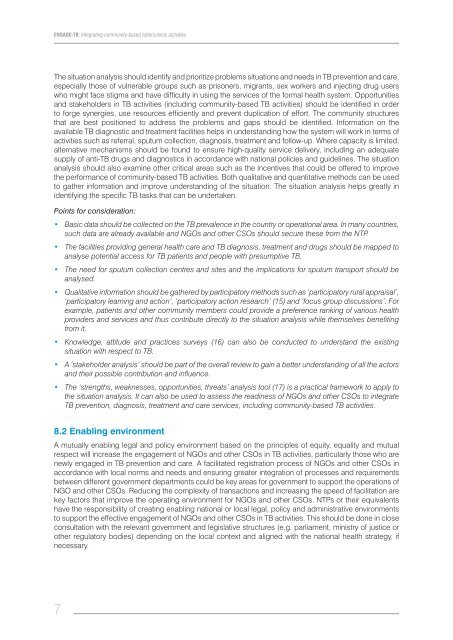ENGAGE-TB: Operational Guidance - World Health Organization
ENGAGE-TB: Operational Guidance - World Health Organization
ENGAGE-TB: Operational Guidance - World Health Organization
You also want an ePaper? Increase the reach of your titles
YUMPU automatically turns print PDFs into web optimized ePapers that Google loves.
<strong>ENGAGE</strong>-<strong>TB</strong>: Integrating community-based tuberculosis activities<br />
The situation analysis should identify and prioritize problems situations and needs in <strong>TB</strong> prevention and care,<br />
especially those of vulnerable groups such as prisoners, migrants, sex workers and injecting drug users<br />
who might face stigma and have difficulty in using the services of the formal health system. Opportunities<br />
and stakeholders in <strong>TB</strong> activities (including community-based <strong>TB</strong> activities) should be identified in order<br />
to forge synergies, use resources efficiently and prevent duplication of effort. The community structures<br />
that are best positioned to address the problems and gaps should be identified. Information on the<br />
available <strong>TB</strong> diagnostic and treatment facilities helps in understanding how the system will work in terms of<br />
activities such as referral, sputum collection, diagnosis, treatment and follow-up. Where capacity is limited,<br />
alternative mechanisms should be found to ensure high-quality service delivery, including an adequate<br />
supply of anti-<strong>TB</strong> drugs and diagnostics in accordance with national policies and guidelines. The situation<br />
analysis should also examine other critical areas such as the incentives that could be offered to improve<br />
the performance of community-based <strong>TB</strong> activities. Both qualitative and quantitative methods can be used<br />
to gather information and improve understanding of the situation. The situation analysis helps greatly in<br />
identifying the specific <strong>TB</strong> tasks that can be undertaken.<br />
Points for consideration:<br />
• Basic data should be collected on the <strong>TB</strong> prevalence in the country or operational area. In many countries,<br />
such data are already available and NGOs and other CSOs should secure these from the NTP.<br />
• The facilities providing general health care and <strong>TB</strong> diagnosis, treatment and drugs should be mapped to<br />
analyse potential access for <strong>TB</strong> patients and people with presumptive <strong>TB</strong>.<br />
• The need for sputum collection centres and sites and the implications for sputum transport should be<br />
analysed.<br />
• Qualitative information should be gathered by participatory methods such as ‘participatory rural appraisal’,<br />
‘participatory learning and action’, ‘participatory action research’ (15) and ‘focus group discussions’. For<br />
example, patients and other community members could provide a preference ranking of various health<br />
providers and services and thus contribute directly to the situation analysis while themselves benefiting<br />
from it.<br />
• Knowledge, attitude and practices surveys (16) can also be conducted to understand the existing<br />
situation with respect to <strong>TB</strong>.<br />
• A ‘stakeholder analysis’ should be part of the overall review to gain a better understanding of all the actors<br />
and their possible contribution and influence.<br />
• The ‘strengths, weaknesses, opportunities, threats’ analysis tool (17) is a practical framework to apply to<br />
the situation analysis. It can also be used to assess the readiness of NGOs and other CSOs to integrate<br />
<strong>TB</strong> prevention, diagnosis, treatment and care services, including community-based <strong>TB</strong> activities.<br />
8.2 Enabling environment<br />
A mutually enabling legal and policy environment based on the principles of equity, equality and mutual<br />
respect will increase the engagement of NGOs and other CSOs in <strong>TB</strong> activities, particularly those who are<br />
newly engaged in <strong>TB</strong> prevention and care. A facilitated registration process of NGOs and other CSOs in<br />
accordance with local norms and needs and ensuring greater integration of processes and requirements<br />
between different government departments could be key areas for government to support the operations of<br />
NGO and other CSOs. Reducing the complexity of transactions and increasing the speed of facilitation are<br />
key factors that improve the operating environment for NGOs and other CSOs. NTPs or their equivalents<br />
have the responsibility of creating enabling national or local legal, policy and administrative environments<br />
to support the effective engagement of NGOs and other CSOs in <strong>TB</strong> activities. This should be done in close<br />
consultation with the relevant government and legislative structures (e.g. parliament, ministry of justice or<br />
other regulatory bodies) depending on the local context and aligned with the national health strategy, if<br />
necessary.<br />
7

















